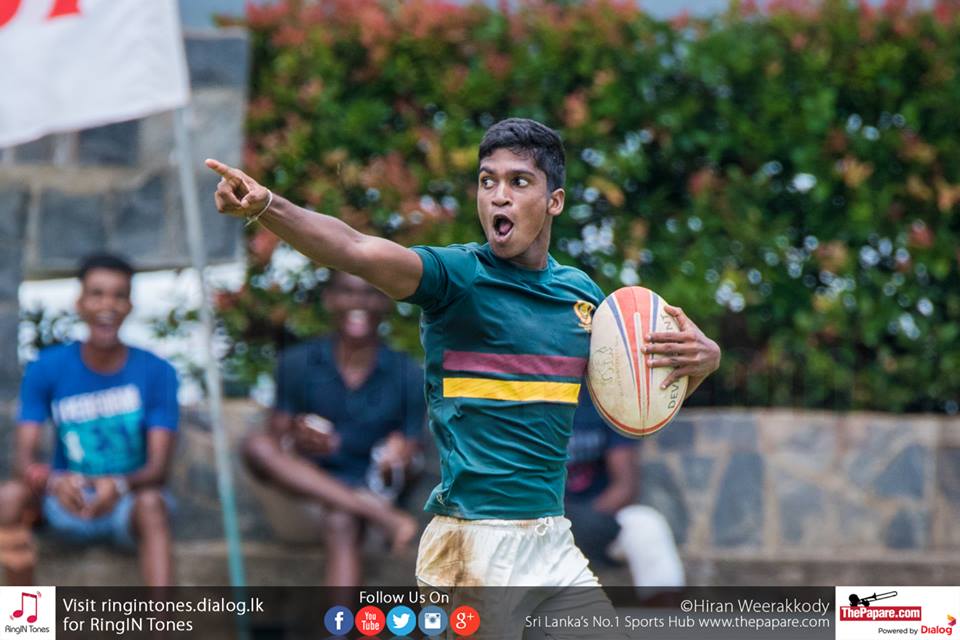Good, better, best.
Never let it rest.
‘Til your good is better
And your better is best.
Around 400AD St. Jerome put pen to paper and wrote the above poem that many have used as motivation for living a better life and I would like to think this attitude could be used for the benefit of Sri Lankan rugby too.
Recently I had the good fortune to be present for the U18 7’s tournament held at the Racecourse grounds in Colombo. The raw talent on display was encouraging although the skill levels varied from well drilled teams to school yard heroes. We were presented with the usual suspects who dominated the first day’s play and made their way to the Cup quarter finals.
Trinity College Kandy, St. Joseph’s College Colombo, Science College Mt. Lavinia and St. Anthony’s College Kandy were the stand outs with Science College being their usual elusive selves. The boys from Mt. Lavinia, who grow up playing rugby at the beach, find running on the firm Racecourse track a breeze and seem to fly across the turf while the Kandy teams relish the contact with St. Anthony’s, in particular turning the ball back inside using the cut move often to draw in extra defenders. With the extra defenders being sucked into the tackle contest, space often opens up somewhere else.
Trinity College Kandy supporters were pleased with their U18 7’s team as they brought some long awaited silverware back to Kandy. Like the other teams at the pointy end of the tournament the outstanding feature of the boys from Trinity was their support play and the off loading in contact. Once a player of size and strength goes into contact and has an opportunity to off load, it is the responsibility of the other players to run support lines and communicate so the opportunity is converted into points.
Another attacking feature of the better teams on show was the realigning and depth of the players who were working off the ball. This feature can only be developed on the training paddock. Drilled into teams after hours of work spent on attacking structure and understanding where the best opportunity is at any time.
A lack of communication is a big problem I see at school boy level games in Sri Lanka. Not enough players talk to each other about what is happening in front of them. In both defence and attack, players who can communicate useful information to their team mates becomes invaluable. In attack we often see players who are in space and if they get the ball they will score but they do not let the players inside know their situation.
As a coach it is frustrating because after training, players talk non stop and you can not keep them quiet, but during the game we just do not hear from them all. Teams that can communicate and work off the ball at the same time will have half of the battle won. Obviously catch and pass, running lines and the ability to tackle are areas that influence the game as well but having one without the other makes life pretty hard for teams and coaches alike.
The teams that finished in the lower part of the draw after day one I feel need some direction and coaching from the Sri Lankan Rugby Union. It was obvious that all that the players enjoyed playing rugby but some of the catch and pass, and positional play can be tidied up by a weekend course for the coaches. Running lines were often across the field and poor positional play left attackers and defenders isolated too often. All the coaches I have been associated with have a desire to improve their rugby knowledge and the higher you go in the coaching ranks the stronger the desire is to learn. Maybe the union could give these coaches a day seminar on 7’s kick offs, set piece and attack and defensive structures at the beginning of the 7’s program.
If 7’s is where Sri Lanka Rugby sees the future then investing in the coaches of the regional teams seems like a no brainer. Also I was a little confused about the ineligibility at this tournament of the Sri Lanka U18 squad that played at the Junior Commonwealth Games less than a month ago. Why are we playing a different age group classification in Sri Lanka to the international age group classifications where we are hoping to make our mark. If it is International recognition we are after then we should play our tournaments along the same age group lines as the rest of the world.
There are questions arising about the timing of a local U18 7’s event being held directly after, instead of before, an international tournament. Imagine a National coach seeing speed, skills and talent a month after coming 5th at the Youth Commonwealth Games in the Bahamas. Could any of the players who displayed their talents at the Racecourse grounds been used by the National coach?
With all tournaments once they are successfully completed a review of the processes involved in holding the tournament can show what was done well and what can we learn from the experience. A true island wide U18 7’s tournament would need to have a qualifying event and also have all of the rugby schools in attendance. Isipathana, St. Thomas’s Mt Lavinia, Kingswood and St. Peter’s were missing and we all know that rugby talent grows in abundance at these schools.
The tournament as a whole, in terms of organisation, rugby talent and refereeing, was good but I believe we should strive to make it better. And as St. Jerome said,” Good, better, best. Never let it rest. ‘Til our good is better and our better is BEST!”



















